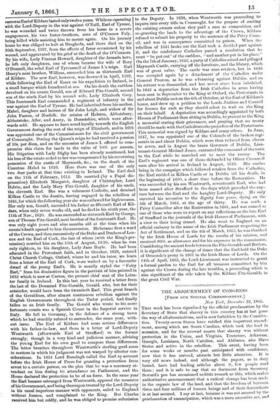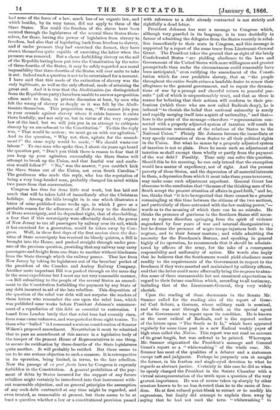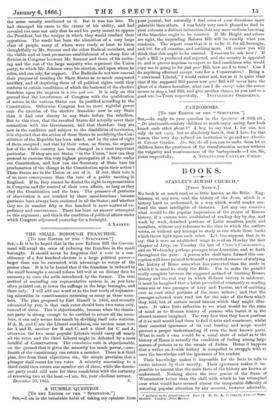THE ADJOURNMENT OF CONGRESS.
[FROM OUR SPECIAL CORRESPONDENT.] New York, December 22, 1865. Tuts week has been signalized by the official proclamation by the Secretary of State that slavery in this country has at last gone the way of all abominations, and is now forbidden by the Constitu- tion. Twenty-seven States have ratified this important amend- ment, among which are South Carolina, which took the lead in secession, and for the avowed reason that slavery was without protection in the Union, and Virginia, Tennessee, Arkansas, Georgia, Louisiana, North Carolina, and Alabama, also Slave States and active in the rebellion. This event, having been for some weeks or months past anticipated with confidence, now that it has arrived, attracts but little attention. It is very old news indeed, and although the papers, as in duty bound, have had leading articles about it, few people read them ; and it is safe to say that no document from Secretary Seward's pen has occasioned so little remark as this, which makes authoritative announcement that a radical change has been made in the organic law of the land, and that the freedom of between three and four millions of human beings and of their descendants is at last secured. I say at last, because it was not secured by the proclamation of emancipation, which was a mere executive act, and had none of the force of a law, much less of an organic law, and which besides, by its very terms, did not apply to three of the Slave States. Nor could the freedom of the slaves have been secured through the legislatures of the several Slave States them- selves, for these, having the power of legislation from slavery to freedom, had also that of legislating back from freedom to slavery, and if under pressure they had exercised the former, they have shown themselves quite capable of exercising the latter when the pressure was removed. But a clause forbidding slavery on the soil of the Republic having been put into the Constitution by the voice of three-fourths of the States, it may be safely regarded as a moral impossibility that three-fourths of the States will ever unite to take it out. Indeed such a question is not to be entertained for a moment. I have said that this mode of the extinction of slavery was the only legitimate, as well as the only effectual, mode of attaining the great end. And it is true that the Abolitionists (as distinguished from the Republican party) havebeen unable to answer aproposition often made to them, in private discussion at least, by men who felt the wrong of slavery as deeply as it was felt by the Aboli- tionists themselves. This proposition was, " We cannot join you in your crusade against slavery where it exists because it exists there lawfully, and not only so, but in virtue of the very organic law of the land, but we will join you in an attempt to extirpate slavery by an amendment to the Constitution." To this the reply was, "That would be useless; we must go on with our agitation." And to the question, " Why not, then, agitate for the amend- ment ?" the same reply would be made, " We should waste our labour." To one man who spoke thus, I about six years ago heard the question put, " Don't you think there is reason to fear that if you keep up your agitation successfully the Slave States will attempt to break up the Union, and that fearful war and confu- sion would follow?" "No," was the answer, "you couldn't kick the Slave States out of the Union, not even South Carolina." The gentleman who made this reply, who has the reputation of being a very long-headed man, probably changed his mind within two years from that conversation.
Congress has thus far done little real work, but has laid out much that will be taken hold of immediately after the Christmas holidays. Among the bills brought in is one which illustrates a letter of mine published some weeks ago, in which I gave as a probable reason for the adherence of New Jersey to the doctrine of State sovereignty, and its dependent right, that of slaveholding, a fear that if this sovereignty were effectually denied, the power of New Jersey to tax all passengers by railway over its soil, which it has exercised for a generation, would be taken away by Con- gress. Well, in these first days of the first session since the doc- trine of State sovereignty has received its bloody quietus, a Bill is brought into the House, and pushed straight through under pres- sure of the previous question, providing that any railway may carry passengers and freight from one State to another without hindrance from the State through which the railway passes. That law frees New Jersey by taking its legislature out of the breeches' pocket of the president of the Camden and Amboy Railway Company. Another more important Bill was pushed through on the same day in the same expeditious but I must say not very reasonable manner, —a Bill submitting to the people of the several States an amend- ment to the Constitution forbidding the payment by any State of any debt incurred in aid of the late rebellion. This disposition of the question of the rebel war debt will not surprise the readers of these letters who remember the one upon the rebel loan, which was published some weeks before President Johnson's announce- ment of a repudiation of this debt as essential to restoration. I heard from London lately that that rebel loan had recently risen, from some cause unknown, and was quoted at from eight to nine. To those who " bulled " it I commend a serious consideration of Senator Wilson's proposed amendment. Nevertheless it must be admitted that to pass an amendment of this nature in a legislative body of the temper of the present House of Representatives is one thing, to secure its ratification by three-fourths of the State legislatures quite another. It will probably be ratified. But there seems to me to be one serious objection to such a measure. It is retrospective in its operation, being limited, in terms, to the late rebellion. Now the passage of ex post facto laws by Congress is expressly forbidden in the Constitution. A general prohibition of the pay- ment of debts by States incurred for the support of any future rebellion might certainly be introduced into that instrument with- out reasonable objection, and on general principles the assumption of any such debt contracted at any time might be regarded, and even treated, as treasonable at present, but there seems to be at least a question whether a law or a constitutional provision passed
with reference to a debt already contracted is not strictly and rightfully a dead letter.
President Johnson has sent a message to Congress which, although very guarded in its language, is in tone decidedly in favour of admitting the delegates from the States recently in rebel- lion immediately to their seats in Congress, and this message is supported by a report of the same tenor from Lieutenant-General Grant. The President takes the ground that as eight of the lately Confederated States " are yielding obedience to the laws and Government of the United States with more willingness and greater promptitude than under the circumstances could reasonably have been anticipated," even ratifying the amendment of the Consti- tution which for ever prohibits slavery, that as "the people throughout the entire South evince a laudable desire to renew their allegiance to the general government, and to repair the devasta- tions of war by a prompt and cheerful return to peaceful pur- suits " (all of which is unquestionably true), and that as there is reason for believing that their actions will conform to their pro- fessions (which those who are now called Radicals deny), he is induced " to cherish the belief that sectional animosity is surely and rapidly merging itself into a spirit of nationality," and that— here is the point of the message—therefore "representation con- nected with a properly adjusted system of taxation will result in an harmonious restoration of the relations of the States to the National Union." Plainly Mr. Johnson favours the immediate or very speedy restoration of these States to all their political rights in the Union. But what he means by a properly adjusted system of taxation is not so plain. Does he mean such an adjustment of taxation as shall exempt them wholly or partly from the payment of -the war debt? Possibly. Time only can solve this question. Should this be his meaning, he can only intend that the exemption would be a matter of expediency, not of right. And the present poverty of these States, and the depression of all material interests in them, a depression from which it must take them years to recover, may make some such adjustment expedient. General Grant has alsocome to the conclusion that"themass of the thinking men of the South accept the present situation of affairs in good faith," and he, too, thinks that "it is to be regretted that there cannot be a greater commingling at this time between the citizens of the two sections, and particularly of those entrusted with the law-making power,"— words as to the meaning of which there can be no mistake. He thinks the presence of garrisons in the Southern States still neces- sary to repress disorders springing from the spirit of violence engendered by four years of war and internal disorganization ; but he deems the presence of negro troops injurious both to the negroes, and to their former masters ; and while admitting the necessity for the Freedmen's Bureau, and speaking in general highly of its operation, he recommends that it should be adminis- tered by officers of the army, for the sake of a consequent responsibility and uniformity of action. His words also imply that he believes that the Southerners would yield obedience more readily to the requirements of the Government in respect to the freedmen if they were asserted and maintained by military officers, and that the latter could more effectually bring the negroes to aban- don some of those unreasonable but not unnatural expectations in regard ,to their future condition which, according to all testimony, including that of the Lieutenant-General, they very widely cherish.
Upon the reading of these documents in the Senate Mr. Sumner called for the reading also of the report of Gene- ral Carl Schurz, a German, whose military rank is nominal, and who was sent through the South as the special agent of the Government to report upon its condition. He is known as the most radical of Radicals, and is the reputed author of the letters upon " The South as It Is," which have appeared regularly for some time past in a new Radical weekly paper of high aims called the Nation. This report was not read on account of its great length, but was ordered to be printed. Whereupon Mr. Sumner stigmatized the President's message and General Grant's report as a " whitewashing" of the whole case. Mr. Sumner has most of the qualities of a debater and a statesman except tact and judgment. Perhaps he purposely sets at naught the former, in his fearless and single-eyed devotion to what he regards as abstract justice. Certainly in this case he did so when he openly charged the President in the Senate Chamber with a virtual misrepresentation of the truth upon a question of the very gravest importance. He was of course taken up sharply by other senators known to be no less devoted than he to the cause of free- dom. He at first refused point-blank to retract or to modify his expressions, but finally did attempt to explain them away by I saying that he had not used the term " whitewashing" iu the sense usually attributed to it. But it was too late. He had damaged his cause to the extent of his ability, and had revealed too soon not only that he and his party meant to oppose the President, but the temper in which they would conduct their opposition. The result has been the alienation of a very large class of people, many of whom were ready at least to listen thclughtfully to Mr. Sumner and the other Radical members, and the visible and at least premature establishment of a sharp line of division in Congress between Mr. Sumner and those of his inclin- ing and the rest of the large majority who represent the Union party, to which Mr. Johnson owes his election, and upon whom he relies, and can rely, for support. The Radicals do not now conceal their purpose of treating the Slave States as so much conquered territory, and of depriving them of all political rights until they conform to certain conditions, of which the bestowal of the elective franchise upon the negroes is a sine qua non. It is only on this ground that the interference of Congress with the qualification of voters in the various States can be justified according to the Constitution. Otherwise Congress has no more rightful power over the exercise of the elective franchise now in any State than it had over slavery in any State before the rebellion. But to this view, that the revolted States did actually sever their connection with the Government, and that therefore they are now in the condition and subject to the disabilities of territories, it is objected that the action of these States in modifying the Con- stitution of the Republic has been asked, and in the case of eight of them accepted ; and that by their votes, as States, the organic law of the whole country has been changed in a most important particular. If they are not States " in the Union," how can they pretend to exercise this very highest prerogative of a State under our Constitution, and how can the Secretary of State base his proclamation of the change in the Constitution upon their action ? These States are in the Union or out of it. If out, their vote is of no more consequence than the vote of a public meeting in England. If in, they cannot be denied the right to representation in Congress and the control of their own affairs, so long as they obey the Constitution and the laws. The presence of garrisons of observation is not touched by these considerations ; because garrisons have always been stationed in all the States; and whether they are in number fifty or five hundred is mere matter of ex- pediency and convenience. There has been no answer attempted to this argument ; and this is the condition of political affairs under which Congress adjourned yesterday for a fortnight.
A YANKEE.






































 Previous page
Previous page